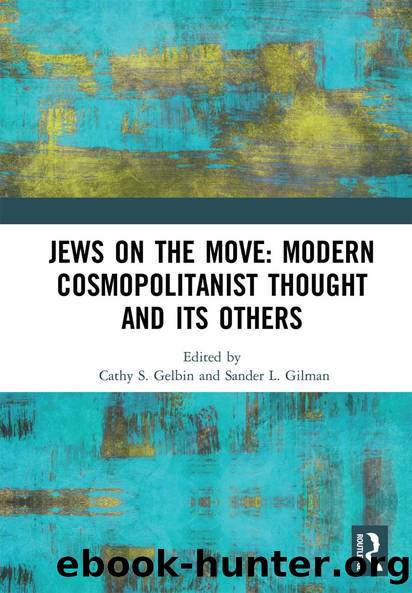Jews on the Move: Modern Cosmopolitanist Thought and its Others by Cathy Gelbin Sander L Gilman

Author:Cathy Gelbin, Sander L Gilman [Cathy Gelbin, Sander L Gilman]
Language: eng
Format: epub
ISBN: 9780472901111
Barnesnoble:
Publisher: University of MICHIGAN Press
Published: 2019-01-25T00:00:00+00:00
Arthur Koestler, Darkness at Noon
When Arthur Koestler wrote his seminal novel Darkness at Noon (1940), he obviously did so with far more extensive knowledge of the Great Purges than Rühle-Gerstel had available in 1937â8.28 The son of a Hungarian-Jewish father and an Austrian-Jewish mother, Koestler was born in Budapest in 1905. He joined the Zionist movement while a student in Vienna, becoming head of the Association of Zionist Student Leagues and forming the Activistsâ League, an organisation sympathetic to Wladimir Jabotinskyâs Zionist right wing. This led to his rejection by the socialist Kibbutzim after his emigration to Palestine in 1926, which would provide a first point of dissonance with the socialist movement. In 1931, while living in Berlin, Koestler nonetheless joined the Communist Party. In 1933, he went into exile in Paris, just after having visited the Soviet Union. He left the Communist Party in 1938 and, after a four-month internment in the notorious Le Vernet camp, found refuge in Britain in 1940. He died in London in 1983.
Darkness at Noon provided the first concerted attempt to address the Great Purges. The novel conveys the profound disillusionment and shock that Koestler felt during his 1933 visit to the Soviet Union, during which he encountered what would become his novelâs central theme. This was Stalinismâs betrayal of its own subjects, which he had encountered during his Soviet visit and which he now located in the foundations of Stalinist ideology and politics. Set in a Soviet jail, the novel explores the Stalinist purges of first-guard revolutionaries between 1936 and 1938 through the eyes of the accused former Comintern representative Nicolas Salmanovitch Rubashov. Through Rubashov, Koestler places the Jew at the centre of the Stalinist narrative and its critical examination, as well as pre-empting the post-1945 Stalinist persecution of Jews among the Communist guard. Similarly to Rühle-Gerstelâs Hanna, however, Rubashovâs Jewishness remains only implicit, a narrative strategy reflecting the subordinate role of Jewishness within both assimilationist and Communist identity politics.29 Rubashovâs Jewish origins are suggested through his middle name, Salmanovitch, which indicates that his father bore the Hebrew first name Salomon (Shlomo). In this context, Rubashovâs intellectual pretences, his internationalist convictions, and extensive travels abroad, which link him to the image of the Jew as a nomad, add further meaning. While installed as a functionary, Rubashovâs âlong difficult to understandâ (KD, 15) speeches at conferences, which suggest his abstract intellectualism â a mode of thinking that antisemitic discourse ascribed to the Jews â had praised the Comintern and the world revolution. Now, the party deems him a âQuerulous intellectualâ (KD, 29) and thus suspect.
As was the case with so many, Rubashovâs faithful service, first to the revolution, then to the Communist state, predestines him for, rather then protects him from, the purges. Once a dedicated Communist, Rubashov has delivered others presumed to be political deviants to the deadly purges. These, however, have left him increasingly disillusioned until his turn has come. The same is true for another convict in the jail. This is
Download
This site does not store any files on its server. We only index and link to content provided by other sites. Please contact the content providers to delete copyright contents if any and email us, we'll remove relevant links or contents immediately.
Guns, Germs and Steel by Diamond Jared(2370)
Collapse: How Societies Choose to Fail or Succeed by Jared Diamond(1520)
The Emperor of All Maladies by Siddhartha Mukherjee(1443)
Transcendence by Gaia Vince(1140)
148424513X by Unknown(1079)
Seven Skeletons by Lydia Pyne(1075)
Civilization One by Christopher Knight(1012)
Sapiens - A brief history of humankind (Marathi) by Yuval Noah Harari(997)
The Rational Optimist: How Prosperity Evolves by Matt Ridley(967)
THE MASTER AND HIS EMISSARY by Iain McGilchrist(945)
Guns, Germs, and Steel: The Fates of Human Societies by Jared M. Diamond(942)
At Home by Bill Bryson(911)
Underworld The Mysterious Origins of Civilization by Graham Hancock(907)
How the Irish Saved Civilization by Thomas Cahill(899)
Marco Polo by Laurence Bergreen(894)
Atrocitology by Matthew White(883)
Ancient Iraq by Georges Roux(863)
Guns, Germs and Steel: The Fates of Human Societies by Jared Diamond(856)
The World Until Yesterday: What Can We Learn From Traditional Societies? by Jared Diamond(855)
